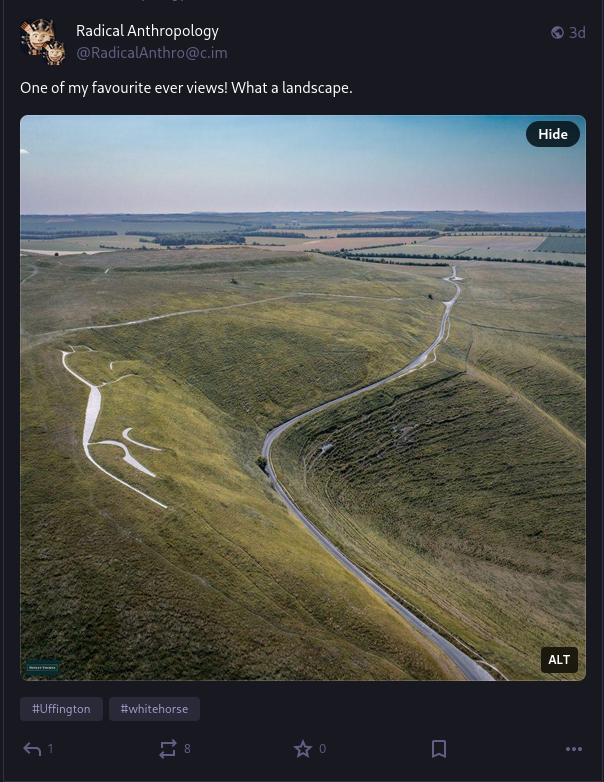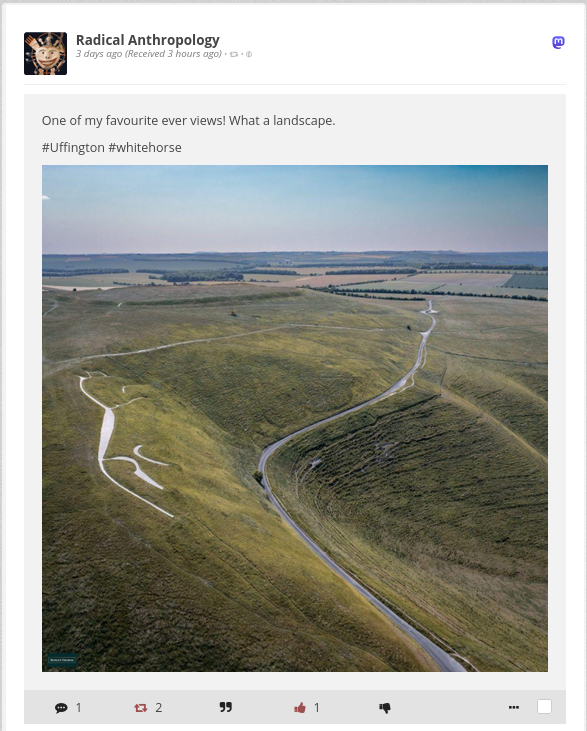By: Simon Brooke :: 23 August 2025
If you've been browsing through your Mastodon feed, and you come upon a post with nice formatting — perhaps words emboldened or italicised, perhaps with an embedded link — and you've wondered how that post was written, the answer may be Friendica.
I've only been using Friendica for a few days, so this is a very preliminary review. It's a big complex system with a lot of configurability, which I certainly have not mastered yet.
What is Friendica? It's one of a number of alternative federated social network server programs which share a common interoperating protocol — ActivityPub — with Mastodon. This collectivity of servers running heterogeneous software but sharing the ActivityPub protocol is informally known as 'the Fediverse'. Because Friendica is a program, and open source, there are many Friendica instances, if rather fewer than there are Mastodon instances. Because they share a common protocol, users on Mastodon instances can follow users on Friendica instances (provided they federate with each other), and vice-versa. But Friendica offers a substantially richer (and conceptually quite different) user experience than Mastodon. While Mastodon is by conception quite Twitter-like — a continuous stream of short, by default unformatted, posts, presented to you in the order in which they have most recently been interacted with by someone you follow, Friendica is said to be rather more Facebook-like (it's a long time since I've used Facebook, so I'm not sure to what extent this is true). Its presentation is fairly configurable but by default it shows posts in conversations, so you shouldn't ever see a post which is out of context.
Richer posts
By default, Friendica allows you to format what you post with Markdown. Markdown is an extremely simple syntax for marking up text, and one which is now widely used — it's what I'm using right now to write this blog post, and, indeed, what I use to write all my blog posts. A benefit of Markdown is that it is human-readable and indeed unobtrusive even if not translated into some other markup for presentation, while also being extremely easy to parse and convert into HTML or PDF or LATEX or OpenDocument or — perish the thought — even Microsoft Word.
With such formatting tools we can create richer posts on Friendica than Mastodon. However, because ActivityPub specifies that a post is passed over the network both in its source form — what the author actually typed — and its presentation form, how the originating platform formatted that for presentation to its users, whether you're reading those richer posts on Friendica or on Mastodon (or on any other ActivityPub compliant system), you should see the rich presentation.
Interoperability, and limits to it
Most of the activity I'm so far seeing on Friendica is posts from people I already follow on Mastodon. The more spacious presentation on Friendica does benefit those posts, especially those with media attachments. Compare these three pictures of the same post:

(Mastondon default user interface)

(Mastodon 'Advanced Web Interface')

(Friendica default user interface)
The Friendica presentation has subtly more room to breathe, but also conveys more information and options: we see not only when it was posted — in a natural English expression rather than a cryptic '3d' — but also when it was received by the Friendica instance. We see, icon top right, that it was posted to Mastodon; we have a 'quote post' option (third icon at the bottom) and a 'down vote' option (fifth icon) in addition to the 'reply', 'repost/boost', and 'upvote/favourite' that Mastodon also provides.
So interoperation between Mastodon and Friendica works: stuff posted in one can be read in the other, provided you follow people who post or boost it. And responses made on Mastodon to posts made on Friendica show up on Friendica (and vice versa). This is as you'd expect; it's as if the Friendica instance you're on were just another Mastodon instance, and for most purposes it is.
Some things don't work, for perfectly good reasons. Mastodon has long had a policy of not allowing 'quote-posting,' because quote-tweeting on Twitter gained a reputation for being a mechanism for abuse and bullying. Friendica does allow quote-posting, but when a post with an embedded quoted post is rendered on Mastodon, the embedded quotes post is rendered only as a link.
What's different?
Presentation
Because Friendica is by default conversation focused rather than post focused, you get many fewer posts per unit of scrolling. There's a lot of configurability in the interface and there must be ways to collapse the conversation display, but I have not yet found it. On the other hand, this does make the Friendica display a lot less cluttered and information-dense than the Mastodon 'Advanced Web Interface' which I habitually use, and I am finding that pleasant.
Rich text formatting
As I've said above, the most obvious difference is rich text formatting, through Markdown or through BBCode. Friendica is not the only Fediverse server to support rich text formatting, I believe there are unofficial forks of Mastodon that do. But for me, it's quite a win.
Subscriptions to other protocols
In addition to ActiviryPub, Friendica supports subscription to Really Simple Syndication (RSS) and Atom feeds. These are very similar and largely interchangeable formats for sharing information about web resources, and are commonly used by news websites and blogs to announce new stories (as well as by podcasts to announce new episodes). Subscribe to a site's RSS feed, and its new stories will show up in your Friendica feed just as though someone had posted them for you. However, I have had trouble with some RSS feeds which Friendica failed to recognise, and therefore subscribe to. I'm not sure what the issue was here; it may simply have been that the server was overloaded (it was running slow).
Where this works, it's a really nice feature, which I greatly appreciate. However, I have been having a little difficulty with it.
Calendars
The ActivityPub protocol has a lot of thought put into sharing events and calendars, but this is not part of the protocol that Mastodon implements. Friendica does implement these, but I have not yet investigated them. It doesn't appear that you can subscribe to calendars from other places, for example by using an iCalendar feed.
Languages
Mastodon — or, specifically, mastodon.scot, which is the Mastodon instance I user — now has excellent facilities for automatically translating posts written in languages you can't read. So it's really easy to follow people from anywhere in the world, even if you don't have a common language. I really appreciate this. Friendica doesn't appear to have the same function; it can tell you what language a post is written in, but it doesn't currently seem able automatically to translate them. However, I know that mastodon.scot does this by hooking in a commercial back-end translation server, which costs money; so this may not be a limitation of the software but simply of the particular instance.
Problems?
The Friendica instance I've chosen to use — social.trom.tf — definitely struggles with performance at times. I've had repeated 504 'Gateway timeout' errors, and some things haven't worked I suspect because of timeouts.
Friendica is written in PHP, a hacked up 'language' which jumbles logic with presentation and lacks clear conceptual design, which I abandoned as obsolete in 1997. There are well regarded systems still written in PHP — Wordpress is one — but I confess I wonder whether poor technical choices contribute to poor performance here. But there may be many other reasons for poor performance of a free, community maintained service, so I may simply be being prejudiced about this.

